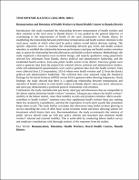| dc.description.abstract | TOM MWENDE KAJUNGU (2012-MI91-1001I)
Remuneration and Retention of Health Workers in Rural Health Centres in Ibanda District
Introduction: this study examined the relationship between remuneration of health workers and their retention in the rural areas in Ibanda district. It was guided by the general objective of contributing to the improvement of health of the rural communities in Ibanda district by establishing the relationship between preferential remuneration and health workers retention in the rural areas, results of which when used by policy makers would inform decision making. The specific objectives were: to examine the relationship between pay levels and health workers retention, to establish the relationship between performance rated pay and health workers retention and, to assess the relationship between allowances and health workers retention. Methodology: the study employed a descriptive-cross sectional design, and majorly qualitative using purposively selected key informants from Ibanda, district political and administrative leadership, and the established health workers, from nine public health centres in the district. Interview guides were used to generate data from the purposively selected district political and administrative leaders, while self-administered questionnaires were used to generate data from the health workers. Data were collected from 115 respondents, 103 of whom were health workers and 12 from the district political and administrative leadership. The collected data were analysed using the Statistical Package for the Social Sciences (SPSS) version 16.0 to generate tables showing frequencies. Study findings: the study showed that there is a significant relationship between remuneration and retention of health workers in rural health centres in Ibanda district since pay level, allowances and merit pay demonstrated a profound positive relationship with retention.
Conclusions: the study concludes that pay levels, merit pay and allowances that are comparable in the labour market determine health workers‟ retention. Adequate pay reduces the health workers‟ mobility in the labour market, raises their stability on jobs and promotes retention. Merit awards
contribute to health workers‟ retention since they supplement health workers basic pay making them less strained by expenditures, and that the expectation of such merit awards like promotion keeps them on job. The study further concludes that allowances keep health workers glowing in service absorbing the costs of other basic social economic needs and hence allowing salaries for investment which fosters their stay. Recommendations: the study recommends that ministry of public service should come up with pay policy reforms and structures that minimise health workers‟ internal and external mobility. This is achievable by conducting labour market survey and employee consultations with thorough analysis of the responses from the studies.
Key Words: Remuneration, Retention, Health Workers, Rural Health Centres, Ibanda District | en_US |


